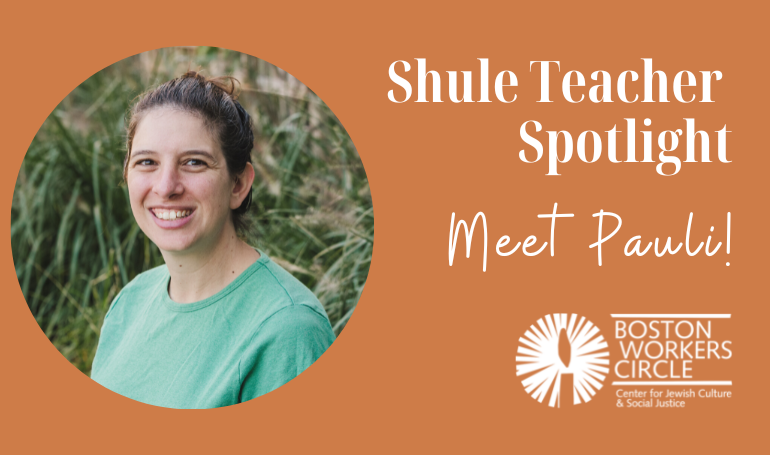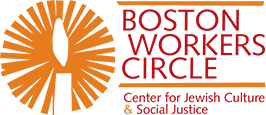
Shule Teacher Spotlight: Meet Pauli
Welcome to our new series: Shule Teacher Spotlight! Throughout the year, we’ll interview as many of our Shule teachers as we can so the whole community can get to know them a little better.
Meet Pauli Katz: Pauli (She/Hers) is a former Shule student herself, and has taught Kindergarten, Giml, and Zayen classes over her many years teaching Shule. She is currently teaching the Giml class.
BWC: Pauli, let’s start with basics – why do you teach Shule, of all the other things you could be doing on a Sunday?
Pauli: Yeah! I could be sleeping! Why do I teach a 6th day a week? Because I love it. It’s hard to get across the river sometimes (it’s been hard to get there since I was in Shule myself!) but once I’m there, it’s an absolutely amazing place. It’s a place that brings me joy. It’s a place that recharges me for the week. My students are a big part of that. Each class is completely different and brings something unique – it’s so exciting to watch them engage with the content and each other. Also, I love my community and I love teaching – this is a skill I have I can use to help my community.
BWC: How does being a part of Shule impact your Jewish identity?
Pauli: They say you learn when someone teaches you something, but you learn twice as much when you teach it to someone else. It’s really neat to be able to think and re-think through what I’m imparting to my students, and what I learn from them as well. It means I’m regularly confronting and examining my Jewish identity and the world around me and what that means.
BWC: What brings you joy outside of Shule?
Pauli: I love my 5 day a week teaching job at Next Wave/First Circle, the therapeutic alternative middle and high school in Somerville. It’s exhausting and teaching is definitely taking years off my life with the stress, but it’s the thing that brings me joy – it’s work that I feel satisfied with at the end of the day. And of course, I love singing, and I love my community, and I love singing with my community!
BWC: What are some of your favorite parts of the Shule curriculum?
Pauli: I love to teach the Giml class, where we talk about the Ashkenazi immigrant experience and getting to introduce the concepts and ideas that are central to the Shule curriculum. When I taught kindergarten, the focus was mitzvah, and why we do things for other people, and then digging deeper and talking about how we can turn that into a higher level of support for the people around us. With teaching Giml, we are able to really get into the historical content and start talking about how history impacts us, which comes back again in 5th grade when we talk about the labor movement. When I got to teach Zayen, it was so clear to me that this was a full experience curriculum that is so well thought out.These kids have heard these concepts and ideas again and again in different ways over the years and Zayen is really just tying the bow, tying it all together.
I love our curriculum and love what I get to do in it as the Giml teacher – lots and lots of fun with Yiddish, the Ellis Island and sweatshop simulations, and just creating experiences that my students will look back on and feel good about and find meaning in when they’re in high school, college, and beyond.
BWC: What kinds of Big Issues do Shule kids get to grapple with?
Pauli: As part of snack (which is supposed to be 10 minutes, but let’s be real, it takes that much time just to cream cheese everyone’s bagel), while the kids eat, we have what I call “Social Justice Time.” Students come with their ideas and questions about what’s going on in the world and what they’ve seen on the news. This is their opportunity to talk with their peers and clarify their ideas – it’s fascinating what third graders pick up! The kids are so conscious of what’s going on in the world – sexism, Ebola, climate change, war, teachers going on strike, etc. Shule is a place where they can talk with their peers and grapple with these issues, and not just hear about it from their parents or teachers but really connect with what their own age group is seeing/feeling about what’s going on in the world.
BWC: What’s your favorite lesson to teach?
Pauli: Gevald, that’s a hard one. While I really love the Ellis Island simulation when the yiddish committee guest stars as immigration officers, I Would have say my favorite one off lesson would be the Sweatshop Day. We start outside the classroom, pre-industrial revolution, and the students make portraits – we discuss how much skill and time goes into them, and then I “pay” quite a lot for them because they are one-of-a-kind. Then we move into the classroom and discuss a new plan for pictures that are much cheaper, so anyone can buy them: the assembly line. The students become workers on the assembly line, and round by round their working conditions get worse and worse. I start ordering them to work faster or ban sitting or dock their pay (bagels) for cutting unevenly or whatever. By the end of round two or three, I’ve fired several of the workers and posters suggesting organizing a union or a strike start to mysteriously appear around the room.
It’s pretty great to see my third graders use organizing tactics (or actually unsuccessfully try what they think are organizing tactics) and we have a great debrief at the end of the day. One year, I had a class flat-out refuse to go on strike because they were concerned about what would happen to their (pretend) families at home. You could tell they were really thinking about all the issues and not just automatically going on strike because that was what they were supposed to do next.
BWC: Can you talk a little bit about how you incorporate Yiddish into your classroom?
Pauli: With kids, you’ve always got to move! We play a lot of games in Yiddish. We play a lot of Lemekh Zogt (Simon Says in Yiddish), Steal the Bacon with Yiddish numbers (except not bacon, and we’re not really stealing anything – they’re just high-fiving me). We play around a lot with Yiddish letters, numbers, body parts. It’s not really teaching Yiddish as a language, but introducing the concept, the same way I introduce the concepts of unions and sweatshops. It’s a foundation, an intro to the concept of Yiddish.
